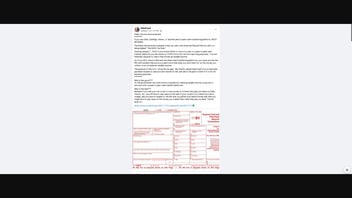
Do users making personal payments on peer-to-peer payment systems like Cash App and PayPal have to follow a "tax rule" for transactions that exceed $600? No, that's not true: No such "tax rule" exists, only a reporting adjustment for business transactions. Although the American Rescue Plan Act of 2021 changed the reporting requirements for transactions that take place through peer-to-peer payment systems, tax experts told Lead Stories that the provision is only for qualifying business transactions, which already were taxable.
The claim appeared in a Facebook post (archived here) published on January 1, 2022. The post opened:
Public Service Announcement
**********
If you use Zelle, CashApp, Venmo, or another peer-to-peer cash transferring platform, KEEP READING:The Biden Administration passed a new tax rule in the American Rescue Plan Act and it is being dubbed 'The $600 Tax Rule.'
Starting January 1, 2022 if you receive $600 or more in a year on a peer-to-peer cash transfer platform you will receive a 1099-K form (for income reporting purposes). You are federally required to report that money as taxable income.
So if you SELL items online and use these cash transferring platforms, you must provide the IRS with receipts that prove you paid more than what you sold them for so the money you collect is not considered taxable income.
This is what the post looked like on Facebook at the time of writing:
(Source: Facebook screenshot taken on Mon Jan 3 20:43 2022 UTC)
The post conflates third-party network transactions -- which, as explained below, are business or "commercial" transactions -- with personal transactions like gifts and donations. The confusion may have stemmed from a misinterpretation of the American Rescue Plan Act of 2021, which was intended to provide the U.S. with additional COVID-19 relief funding and became law in March 2021. Under "Title IX-Committee on Finance," "Subtitle G--Promoting Economic Security," "Part 8-Miscellaneous Provisions" and section 9674, the act's text read:
This section provides for a de minimis exception to the reporting requirements of third party network transactions for transactions not exceeding $600.
The "reporting requirements" are for Form 1099-K. According to the "Instructions for Payee" for the form, a taxpayer would receive the form if they accepted payments from payment cards or, through a third-party network or received gross reportable transactions greater than $600 in a given calendar year. The reporting threshold for Form 1099-K changed from a gross payment threshold of $20,000 with more than 200 individual third party network transactions. Starting after December 31, 2021, the reporting threshold switched to a gross payment threshold of $600 regardless of the number of third-party network transactions.
But to understand the reporting threshold change, "third party network transactions" must be defined. A technical explanation of section 9674 of the American Rescue Plan Act, from the congressional Joint Committee on Taxation, refutes the Facebook post's claim that the provision applies to personal reimbursements or the occasional selling of goods. It explains that third party network transactions only apply to "commercial transactions" which "only include transactions for the provision of goods or services (e.g., personal gifts, charitable contributions, and reimbursements are not included)." The explanation goes on:
For example, an individual who has registered for a mobile payment service and uses such a service to reimburse friends or relatives for expenses, or on occasion sells a used item to another person, would not be engaging in transactions that are subject to reporting requirements. However, if that individual were to register with such mobile payment service for the purposes of engaging in commercial transactions, such as regularly carrying on a trade or business through use of that service, the mobile payment service would be required to report under the provision.
During a phone call to Lead Stories on January 3, 2022, Steven Rosenthal, a senior fellow in the Urban-Brookings Tax Policy Center, said that while the scope of what counts as "commercial transactions" can be murky, peer-to-peer payment systems usually offer the option for users to register for a business account. This option helps payment systems identify which users should receive a Form 1099-K.
In an email to Lead Stories on January 3, 2022, Garrett Watson, a senior policy analyst at the Tax Foundation, told us that the provision found in section 9674 of the American Rescue Plan Act does not change whether a transaction is taxable. Instead, it "provides more data to the IRS and summary information to the taxpayer."
Watson also clarified the Facebook post's claim that a peer-to-peer payment system user would have to provide receipts to the IRS to avoid being taxed for transactions:
Typically, one does not need to 'provide the IRS with receipts' when reporting net earnings on a tax return, though that could happen if the IRS requests information through correspondence or a more formal audit. Of course, it is a best practice to keep those types of records such as expense receipts in case the IRS does inquire on how a taxpayer arrived at their reported taxable income.
Other Lead Stories fact checks about the American Rescue Plan Act can be found here.


















